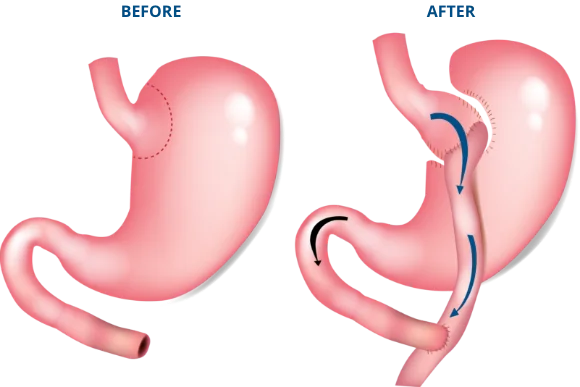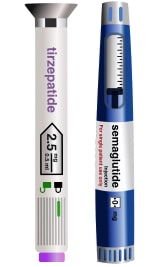Patients often come to our Chicago bariatric surgeons at Suburban Surgical Care Specialists/Kane Center for procedures that can literally change, and in some cases, save their lives. The Roux-en-Y gastric bypass surgery performed at our surgical facilities is clinically proven to be both safe and effective. In fact, the Roux-en-Y gastric bypass operation is one of the most commonly performed types of bariatric surgery.
 Before
Before
 After
After
What Is Gastric Bypass Surgery?
The Roux-en-Y gastric bypass surgery entails creating a small stomach pouch to restrict food intake and bypassing a portion of the small intestine to limit the absorption of calories. The procedure begins by dividing the stomach to create the small pouch. Then, a Y-shaped section of the small intestine is attached to the pouch to allow food to bypass the duodenum (the first section of the small intestine) and a portion of the jejunum (the second segment of the small intestine). This causes reduced caloric and nutrient absorption. After the procedure, patients must take vitamin supplements and pay careful attention to diet to ensure that nutritional needs are met.
Am I a Candidate for Gastric Bypass Surgery?
Ideal candidates for Roux-en-Y gastric bypass surgery have a body mass index (BMI) of at least 40, or they have a BMI of at least 35 with associated illnesses, such as type 2 diabetes, high blood pressure, or sleep apnea. The gastric bypass is often the better choice in patients with significant symptoms of acid reflux. Some individuals may qualify for the gastric bypass procedure with a BMI slightly lower than 35 if they have serious obesity-related health problems. Not all individuals who fit this criteria are eligible for the Roux-en-Y gastric bypass. Candidates will undergo an extensive screening process and will need to pass certain medical requirements. Potential patients will also need to be committed to their long-term health through permanent lifestyle changes. From taking vitamin supplements to paying close attention to nutrient intake, these post-operative lifestyle adjustments are essential to the success of the gastric bypass procedure.
What Is Robotic-Assisted Laparoscopic Gastric Bypass Surgery?
As experts in laparoscopic surgery and robotic surgery, the surgeons at SSCS prefer to perform the Roux-en-Y gastric bypass surgery using minimally invasive methods whenever possible. Although gastric bypass surgery performed using robotic-assisted and laparoscopic techniques is technically demanding, it can provide a patient with a swifter post-surgical recovery, as well as lower the risk of surgical complications.
Using the advanced da Vinci robotic system, your bariatric surgeon will insert tiny surgical instruments into the abdominal area through a series of small incisions. As they view 3D video displayed in real time on the system’s console, your surgeon is able to precisely reduce your stomach size and reroute your small intestine. During this process, your surgeon is able to navigate the surgical site with a magnified view that is ten times that of the human eye, allowing for the utmost accuracy as they operate. In addition, the da Vinci system allows them to move the surgical instruments with greater maneuverability than the human hand.
While robotic-assisted laparoscopic gastric bypass is the primary way our team performs the procedure, it may not be appropriate for all patients. Contact our team to find out if you are a good candidate for laparoscopic gastric bypass surgery.

What Are the Benefits of Gastric Bypass Surgery?
While the Roux-en-Y procedure is not without risks, it provides many benefits to patients who choose to undergo gastric bypass surgery. Obesity surgery operations that restrict food intake and limit the absorption of calories produce more weight loss than bariatric procedures that only decrease food intake. Patients who undergo gastric bypass surgery generally lose two-thirds of their excess weight within two years.
What to Expect After Gastric Bypass Surgery
After undergoing Roux-en-Y gastric bypass surgery, you will have to commit to making the permanent dietary changes that will keep you healthy and free of surgical complications. The good news is that the surgery makes it easier to do this. Patients who undergo the Roux-en-Y gastric bypass consistently report a decrease in the frequency and intensity of their cravings for foods high in sugar and fat. If you have tried other means of weight loss with no success, Roux-en-Y gastric bypass surgery may be the weight loss solution for you. Many post-obesity surgery patients tell us that this procedure has profoundly improved their happiness and has given them back their lives.
What Are the Risks of Gastric Bypass Surgery?
In general, surgical procedures come with potential risks like bleeding, infection, blood clots, and an adverse reaction to anesthesia. More specific to gastric bypass surgery, there may be additional risks that can occur after surgery due to changes made in the digestive process. Some of these complications include nausea, vomiting (usually from overeating), diarrhea, marginal ulcers, heartburn, bowel obstructions, gastrointestinal leaks, malnutrition, reduced mineral absorption, low blood sugar, gallstones, and dumping syndrome (occurs from consumption of high-sugar foods). Fortunately, some of these symptoms can be avoided by carefully following your physician’s post-surgery instructions, eating a proper diet, and incorporating healthy lifestyle changes.
The highly skilled team at Suburban Surgical Care Specialists/Kane Center have performed many gastric bypass procedures over their decades of combined experience. Our team’s expertise and meticulous training using advanced surgical techniques help to mitigate the risks of gastric bypass surgery to provide the safest treatment possible.
What Is the Recovery Like After Gastric Bypass Surgery?
Depending on the individual’s treatment and surgical plan, gastric bypass surgery may require a two-night stay in the hospital. Following surgery, it is normal for patients to experience discomfort, soreness, and bruising at the surgical site; however, these symptoms should fade during the healing process and can be managed with prescribed pain medication taken as directed. Generally, most patients are able to return to work after one to two weeks as long as their job is not labor intensive. More strenuous work and activities, including lifting, pushing, or pulling objects over 10 pounds, should be avoided for about four to six weeks to ensure a safe recovery.
Additionally, certain lifestyle and dietary changes are required for gastric bypass surgery, including strict guidelines during recovery. There should be a slow and steady progression from liquids, to pureed foods, to soft foods, and eventually solid foods as the stomach and intestines heal and adapt. Patients will receive an in-depth guide outlining the recovery process, diet and meal expectations, necessary supplements and vitamins, and plans for increasing physical activity over time. The recovery process will be evaluated during regular follow-up appointments.
How Much Does Gastric Bypass Surgery Cost?
The average cost of Roux-en-Y gastric bypass surgery is approximately $15,000 to $30,000, but this is often covered by insurance providers. The cost of the gastric bypass procedure will vary based on the expertise of your bariatric surgeon and the geographic location of the practice. In addition, associated fees like anesthesia and medications will also factor into your total cost. Should you need financial assistance to help cover the costs of your gastric bypass, our team accepts financing options to help you get the care you need through low- to no-interest payment plans. To get a cost estimate for your procedure, please contact us to schedule your personal consultation.
Schedule a Gastric Bypass Surgery Consultation
At Suburban Surgical Care Specialists/Kane Center, we believe it is crucial that all patients wishing to undergo obesity surgery make a fully informed decision. The Roux-en-Y procedure represents both a gateway and a serious commitment to a new, healthy you. For more information on the Roux-en-Y gastric bypass surgery, or to discuss other weight loss procedures including gastric sleeve surgery, contact our office today to schedule a comprehensive consultation. Our surgeons will answer all of your questions with candor and compassion.

